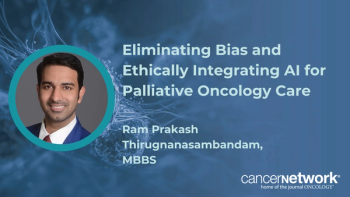
FDA Grants Priority Review to Nivolumab-Cabozantinib Combo for Advanced RCC
The combination regimen demonstrated improved progression-free and overall survival in patients with previously untreated advanced RCC, according to results from the phase 3 CheckMate-9ER trial.
The FDA granted priority reviews to the supplemental biologics license application (sBLA) and supplemental new drug application (sNDA) for nivolumab (Opdivo) in combination with cabozantinib (Cabometyx) to treat patients with advanced renal cell carcinoma (RCC), according to Bristol Myers Squibb and Exelixis – the manufacturers of both agents, respectively.1
The agency assigned a Prescription Drug User Fee Act (PDUFA) goal date of February 20, 2021.
“With their complementary mechanisms of action and evidence that Cabometyx may promote a more immune-permissive environment, we believe there is opportunity for additive or synergistic effects with this potential combination regimen,” Gisela Schwab, MD, president, product development and medical affairs and chief medical officer, Exelixis, said in a press release. “Based on strong supporting data from CheckMate-9ER, the acceptance of our application is important progress in our efforts to make Cabometyx in combination with Opdivo available to patients with advanced kidney cancer who need additional treatment options. We look forward to working with the FDA throughout the ongoing review process.”
Both filings were based on results from the open-label, randomized, multi-national phase 3 CheckMate-9ER trial (NCT03141177) – designed to evaluate nivolumab in combination with cabozantinib (n = 323), compared with sunitinib (Sutent; n = 328), in 651 patients with previously untreated advanced RCC.
In total, 23% of patients were at favorable risk, 58% at intermediate risk, and 20% at poor risk. Moreover, 25% were PD-L1≥1%.
Progression-free survival (PFS) served as the primary end point. Secondary end points included overall survival (OS) and objective response rate (ORR). Moreover, patient-reported outcomes data showed statistically significant improvements in health-related quality of life at most time points.
Median PFS was doubled with the combination regimen, compared with sunitinib (16.6 months vs. 8.3 months; HR, 0.51; 95% CI, 0.41-0.64; P < .0001). In addition nivolumab plus cabozintinib reduced the risk for death by 40% (HR, 0.60; 98.89% CI, 0.40-0.89; P = .0010); however, median OS was not reached in either arm.
The combination also showed a superior ORR, compared with sunitinib, with twice as many patients responding (56% vs. 27%). In addition, 8% vs. 5%, respectively, achieved a complete response. Lastly, nivolumab plus cabozintinib induced a longer duration of response, compared with sunitinib (median, 20.2 months vs. 11.5 months).
Of note, efficacy end points were consistent across the pre-specified International Metastatic Renal Cell Carcinoma Database Consortium (IMDC) risk and PD-L1 subgroups.2
Nivolumab plus cabozantinib appeared to be well tolerated and consistent with both known safety profiles of the agents, with a low rate of treatment-related discontinuations. The incidence of treatment-related adverse events (TRAEs), including any-grade (97% vs. 93%) and high-grade (61% vs. 51%) TRAEs, was slightly higher for the combination arm, compared with sunitinib, respectively. A low rate of treatment-related discontinuations were reported (3% vs 9%).
“We have witnessed practice-changing advancements in the treatment of renal cell carcinoma in recent years, but we recognize the importance of providing patients and physicians with additional options that can help them take control of the disease,” Mark Rutstein, vice president, development program lead, nivolumab, Bristol Myers Squibb, said in the release. “In the CheckMate-9ER trial, combining Opdivo and Cabometyx, 2 proven agents with strong clinical legacies in advanced renal cell carcinoma, led to superior efficacy across all end points. We look forward to working with the FDA to bring this potential treatment option to physicians and their patients who choose an immunotherapy plus tyrosine kinase inhibitor regimen.”
Reference:
1. Bristol Myers Squibb. U.S. Food and Drug Administration Accepts for Priority Review Applications for OPDIVO® (nivolumab) in Combination with CABOMETYX® (cabozantinib) in Advanced Renal Cell Carcinoma. Published October 19, 2020.
2. Bristol Myers Squibb. Opdivo® (nivolumab) in Combination with CABOMETYX® (cabozantinib) Demonstrates Significant Survival Benefits in Patients with Advanced Renal Cell Carcinoma in Pivotal Phase 3 CheckMate -9ER Trial. Published September 19, 2020.
Newsletter
Stay up to date on recent advances in the multidisciplinary approach to cancer.












































